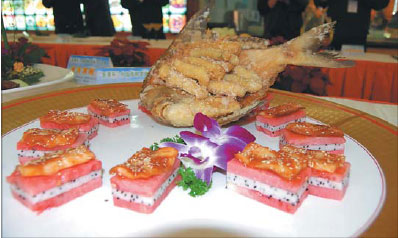Evergreen plans to grow overseas fodder market
Seeing market potential, Zhanjiang-based Evergreen Group is planning to launch new investment projects in Southeast Asian countries.
One of them will be located in Ho Chi Minh City in Vietnam. The project, with a budget of about 70 million yuan ($10.67 million), will include an aquatic fodder factory and an aquaculture facility.
Evergreen is one of the market leaders in Zhanjiang's aquatic industry, involved in almost the whole aquatic industry chain, from breeding, sea-farming, seafood processing, fodder, aquatic medicines, foreign trade and machinery for aquatic processing, packaging, storage and transportation.
The company is a leading supplier of aquatic fodder worldwide and a standard setter of China's aquatic fodder industry. It is also one of China's top five suppliers of aquatic machinery and freezing systems.
The company's decision to invest in Ho Chi Minh City came in the wake of the successful operation of its investments in Vietnam's Da Nang and Ha Long.
The project in Da Nang, with total investment of 50 million yuan ($7.6 billion), became operational in 2010, while the one in Ha Long, with 70 million yuan in funding, became operational in 2013.
"Both projects are operating right on track; our investments have paid off and the returns are satisfactory," said Chen Si, chairman of the company's supervisory board.
"The two projects offer jobs to more than 200 locals," he said, adding that the fodder and related technologies will be used in the aquaculture industry in Vietnam.
The two projects yield over 70,000 metric tons of aquatic fodder a year, he said.
"In proximity to Zhanjiang, Vietnam has a similar condition for aquaculture but the industrial chain is not so well developed as in Zhanjiang," he said. "That leaves great opportunities for us.
"In addition, we can have much lower production costs and better prices there," he said. "That makes better-than-expected profits possible."
He said that aquaculture in Vietnam is seeing rapid development as a growing number of foreign companies including many from China have launched investments there and many local people have followed suit.
"One more reason worth mentioning is our strategy to shun global trade barriers targeting Chinese aquatic companies," he said, adding that many developed countries are more captious with China-made products than products made elsewhere and that Chinese exporters have a much higher market threshold to climb to enter those markets.
He said Evergreen Group has also forged a partnership with an aquatic industrial park in Egypt to supply products, technologies and equipment.
"The initial phase of the Egyptian project will generate sales worth 530 million yuan a year and the whole project will probably bring in 3 billion yuan," he said.
"We are stepping up investments abroad and targeting destinations including Indonesia and Iran in the near future," he said.
Chen said his company would continue to highlight research in its development plan.
He said Evergreen has invested more than 20 million yuan in a fodder lab and the company's R&D budget accounts for more than 3 percent of its annual sales revenue. It has also been involved in several nations' R&D programs.
Many aquatic companies in Zhanjiang have taken similar business strategies to invest abroad in tandem with China's Belt and Road Initiative, said Cen Jian, secretary general of the city's aquatic products import and export association.
"Several more are eagerly preparing," Cen said.
|
Seafood farmed in Zhanjiang are favored by consumers for their high quality. |
(China Daily 05/30/2016 page6)



 Print
Print Mail
Mail


